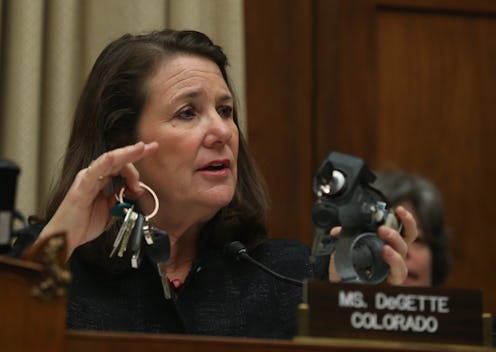News
This Congresswoman Is Publicly Naming The Lawmaker Who Groped Her In An Elevator

Rep. Diana DeGette (D-CO) on Monday joined the growing number of women coming forward with stories of sexual harassment or assault on Capitol Hill. Degette claimed that former Rep. Bob Filner sexually harassed her in an elevator in an interview with MSNBC's Katy Tur. "Believe you me, I never got in an elevator with him again," DeGette told Tur.
DeGette told Tur that "some years ago," Filner tried to pin her to the door of an elevator and kiss her. The alleged event would have occurred before Filner left Congress in 2012. Beginning in 1993, he served as the Democratic representative for California's 50th and later 51st congressional districts. Notably, Filner followed his congressional career with a brief stint as mayor of San Diego. He was forced to resign from that post in August 2013 after 18 women accused him of sexual harassment. Filner previously had said that he didn't sexually harass anyone; reached Tuesday by email about DeGette's allegation, Filner tells Bustle "It never happened."
Degette also related to MSNBC's Tur that when she was a young congresswoman, a French diplomat tried to put his hand up her dress at a state-sponsored dinner. "You can imagine the shock when you're sitting at a dinner like that," Degette said.
Allegations of sexual harassment and assault have flooded the media since the bombshell allegations against Hollywood producer Harvey Weinstein were first published in October. But it's taken several weeks for the national scandal to hit Washington, D.C. Part of that stems from the laborious process involved in reporting sexual harassment and assault on Capitol Hill, a problem that is getting newfound attention as women feel more empowered to speak out.
One of the leading crusaders for that change is Rep. Jackie Speier. After releasing a video in which she detailed her own experience with sexual harassment as a young staffer in Washington, Speier introduced legislation to reform a little-known congressional outfit called the Office of Compliance (OOC).
The OOC is in charge of handling complaints by congressional staff about sexual harassment or assault, as well as discrimination cases. But how the office processes those reports has generated intense criticism. For starters, the person bringing the charge must attend 30 days of counseling. Following that, the complainant is required to complete an additional 30 days of mediation with the alleged harasser. Since 1997, the OOC also has paid out $17 million in taxpayer money to settle claims. It's not clear how much of that money was paid out to victims of sexual harassment and/or assault, since the OOC also handles allegations of discrimination.
Degette and Speier aren't the only prominent congresswomen coming forward with their stories, either. Joining them is Sen. Kirsten Gillibrand (D-NY), who introduced a bill in the Senate similar to Speier's in the House, in the hopes of improving how sexual harassment is handled in D.C. In her memoir, Off the Sidelines, Gillibrand relates several instances of harassment from men working with her in Congress.
Called the Member and Employee Training Oversight On (ME TOO) Congress Act, Speier and Gillibrand's legislation would overhaul how the OOC works, as well as make sexual harassment training mandatory. House Speaker Paul Ryan (R-WI) has ordered an overview of current training, and made sexual harassment training mandatory for all current congressional staff. That change isn't permanent, however; the ME TOO Act would make it so.
Reforming the OOC seems like a meaningful first step toward improving a culture on Capitol Hill that Speier describes as "a breeding ground for a hostile work environment." Degette's story of being allegedly groped by her former colleague backs up that assessment, and further highlights the need for change in how Congress handles sexual harassment and assault cases.